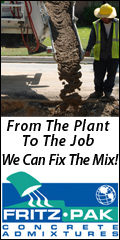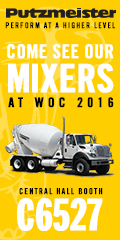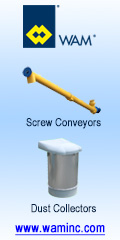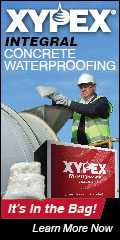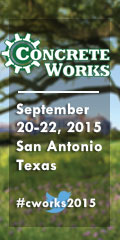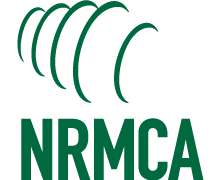
| Archive | nrmca.org | E-Store | Conferences & Events | Certifications | InFocus | Membership Directory |
NRMCA Reports on Recent ASTM Meetings The following is a summary of activity at recent ASTM meetings of Committees C09 on Concrete and C01 on Cement attended by NRMCA staff in Anaheim, CA.
C09.20 Concrete Aggregates - Revised versions of methods to determine relative density (specific gravity) and absorption of aggregates C127 and C128 are now published. A specification for mineral fillers for use in concrete continues to progress through the ASTM balloting process. A version balloted received several negatives that were addressed. Mineral fillers in concrete may be used in self-consolidating or conventional concrete. A presentation indicated that fines from dolomitic aggregates was being used successfully in Ohio and was recognized by the DOT. These materials would comply with the proposed specification on mineral fillers. A proposal to include "recycled material" as aggregate in the terminology of Specification ASTM C33 for Concrete Aggregates, was balloted and received several negatives that were discussed. Recycled materials would need to meet the requirements of C33 with no changes to the specification. A method to measure relative density and absorption by volumetric displacement was presented. The method is purported to measure the absorption of sand and coarse aggregate with better repeatability. The method is published as an AASHTO provisional standard. ASTM will consider standardizing the method. With the publication of practice ASTM C1778 on alkali aggregate reactions, the subcommittee will consider deleting the appendix to C33 on the subject and refer to this standard. C09.26 Chemical Reactions - The subcommittee reapproved the concrete prism test to determine the reactivity of aggregates in alkali silica reactions, C1293, with no revisions. The subcommittee is considering removing two older ASR tests – C227 and C289 – due to their lack of reliability.
C09.40 Ready Mixed Concrete - A new version, ASTM C94-15 has been published. Changes include:
• Clarification that purchaser’s requirements stated in the order that differ from C94 govern and places a responsibility on the purchaser to communicate all requirements for concrete from a project specification.
• Air content is set at two levels for moderate and severe exposure; the purchaser, when ordering concrete, should either state the required air content or indicate the type of exposure.
• Include a requirement that the purchaser should state the required density when ordering heavy weight concrete; ordering lightweight aggregate by stating equilibrium density was clarified.
• Revisions to the appendix that advises on strength overdesign concepts.
Proposal to permit the use of electronic tickets in C94 was balloted and discussed. Item still needs resolution. The subcommittee will revisit the issue of eliminating time limits to delivery; consider a performance-based option and scheduling when ordering concrete; defining batch water with consideration for water held back for addition at the jobsite and several other revisions. A new specification for reuse of returned concrete received several negatives, but continues to make progress toward acceptance. A revised specification will be balloted shortly. C09.48 Performance of Cementitious Materials and Admixture Combinations - After significant effort, a new standard was approved – this practice outlines the use of thermal measurements for evaluation of compatibility of materials. It includes several example evaluations of cement chemistry, fly ash characteristics, relative setting time estimation and impact of temperature of materials. C09.50 Risk Management for Alkali Aggregate Reactions (AAR) - The subcommittee has published a new standard, ASTM C1778 Determining Reactivity of Concrete Aggregates and Minimizing Risk of Deleterious Expansion, similar to the AASHTO provisional standard PP65. Discussions evolved around varying adoption by state highway agencies. There was concern on assignment of risk categories to different structures by users and the excessive amount of SCMs required when this occurred. A simplification of this process was suggested. Some feel that ASTM C1260 should not be recommended for evaluation of the reactivity of aggregates. It was also discussed that the performance option for qualifying quantities of SCMs to mitigate ASR may not be adequate for some situation. The subcommittee will work with various subcommittees that include provisions for ASR to propose deleting those requirements and to refer to ASTM C1778. It was noted that the Cement and Concrete Reference Laboratory (CCRL) has started a proficiency sample program for ASTM C1260 – the accelerated mortar bar test. CCRL will also consider stocking a reference aggregate for ASTM C1293 tests – this aggregate would have an established expansion level for laboratories to compare their results and evaluate their procedures, if necessary.
C09.60 Fresh Concrete Tests - Minor revisions were in process for slump (C143), density or unit weight of fresh concrete (C138) and the volumetric air method (C173). A precision statement based on a recently completed interlaboratory study is being proposed for the pressure air method (C231). A request to reinstate ASTM C1362 (recently withdrawn) on the "K-slump tester" was rejected by the subcommittee. A presentation was made on the measurement of electrical resistivity of fresh concrete. It was suggested that the method could be used to estimate water-cement ratio (with pre-established calibration), estimate setting time, evaluate uniformity of mixing and to predict early age strength. The subcommittee will consider the method.
C09.61 Strength - Revisions to ASTM C39 were proposing tolerances on test age and the time from which the age of the cylinder begins – either at batching or when the specimens were made. A revision to C31 clarifies that the sides of the cylinder should be tapped with a mallet when consolidating specimens in plastic single use molds. A request was made to the subcommittee to consider, including the procedures for preparing cube specimens for concrete strength. Revisions to C31 and C78 will address the use of beams with 4 x 4 inch cross section for flexural strength measurements. A proposal to include reporting the max-min temperature during initial curing in the field on strength test reports was balloted and received negatives. The revision will be reballoted based on comments and other considerations.
C09.66 Fluid Penetration - The subcommittee continues to work on finalizing the surface resistivity test using Wenner probe which can be used for concrete quality assurance.
C01.10 Hydraulic Cement - Revision to cement standards are discussed in an ASTM AASHTO harmonization task group to ensure the requirements in the equivalent ASTM and AASHTO specifications are consistent. Revisions to ASTM C150 were approved – to report chlorides in portland cement on request and to report the heat of hydration based on isothermal calorimetry, ASTM C1702. Proposed revisions include tolerances for the stated quantities of slag, pozzolans and limestone in blended cements covered by ASTM C595. It is proposed to delete the current requirement to determine methylene blue value and total organic carbon of limestone to be interground in blended cements. Research has indicated that these limits do not impact the performance of cement. A proposal has been made to increase the limits of loss on ignition and insoluble residue in ASTM C150 for portland cement. The current limits for LOI and IR do not allow the 5% interground limestone permitted by the specification.
Award - NRMCA Senior Vice President, Engineering, Colin Lobo was recognized as an Honorary member of ASTM Committee C09 on Concrete and Aggregates for his contributions to standards.
Memorials - Memorials were read for recently deceased members Emory Farkas and Darrell Elliot.
|
|
|
